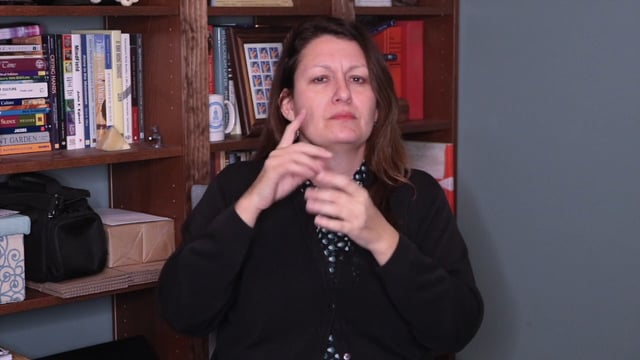This article originally appeared at i711.com.
There’s a new interpreter training/preparation program (ITP) in Quincy, Ill., at Quincy University where my grandmother worked for 35 years. When I learned of this ITP’s establishment, I was flabbergasted for a number of reasons.
First, Quincy only has about 20-30 deaf people in a population of 40,000. The town is also surrounded by farmland and the Mississippi River; it’s not a bustling metropolis or anything of that nature. What this means is that students in the ITP base their skills on a very small handful of Deaf people, who might not always have time to socialize for “silent suppers” or to be part of these students’ immersion in the language or culture. Besides, there’s MacMurray College in Jacksonville, which has a prominent ITP and is a short drive away on I-72. Jacksonville is also where the Illinois School for the Deaf is, and has a large community of native, fluent signers.
To add insult to injury, the Quincy University ITP has only one Deaf teacher. While I won’t get into the politics of the administration there, this trend of ITPs with a few or no Deaf teachers is disturbing. We’re in an age of awareness, where so much has been discovered about the wealth of American Sign Language (ASL), the Deaf community and its culture, and the profession of interpreting.
I recently learned about an ITP here in Minnesota with no deaf teachers; there are deaf teachers at the college, but they teach ASL, not in the ITP. In the past, this college had Deaf teachers in the ITP, but has pretty much pushed them aside in favor of hiring hearing teachers—some of whom don’t really have the best interpreting skills.
This again disturbs me. In an earlier column, I wrote about how ASL teachers must have three traits: fluency, the right attitude, and teaching skills; this, I believe, also applies to ITP instructors. Before I go into that, let’s get one thing clear: without the Deaf community, there would be no need for interpreters and no need for ITPs. Period.
ITP teachers—Deaf or hearing—should be fluent in ASL and English, have an intricate knowledge of the interpreting process, have an outstanding attitude of respect, and yes, teaching skills. Yet, ITPs (and ASL programs) around the country consistently hire hearing teachers over deaf teachers; many of those hearing teachers lack some or all of the aforementioned traits. This isn’t due to a lack of qualified Deaf teachers; there are plenty. And it’s not because deaf people don’t understand the finer points of interpreting and the process, either. There are plenty of Deaf people—Deaf interpreters, for instance—who have all the qualifications and qualities that an ITP instructor should have. Any ITP coordinator who believes otherwise shouldn’t be in that position.
Besides, Deaf instructors bring such valuable insight into the interpreting classroom. They can teach ethics courses, voice-to-sign courses, interpretation courses, and an array of other topics. In situations where they may need someone hearing to be involved—for instance, to listen to voiced interpretations—why not bring in a hearing team teacher? There are plenty of solutions to listening-based units or activities in these situations.
I’m not saying that Deaf instructors should always be chosen over hearing instructors; quite the contrary. I simply think that ITPs need to stop hiring for the sake of convenience, and begin to proactively recruit Deaf instructors. It’s so important to have a balanced, diverse staff. When an ITP has an all-hearing staff, regardless of the hearing staff’s involvement with the Deaf community (i.e., CODA or spouse of a deaf person), it’s imperative to bring in deaf instructors to alleviate this stark gap. We all can agree that Deaf people bring a unique perspective to an ITP, since they themselves are consumers of interpreting services and can bring distinctive insight to the hearing students’ perceptions of the Deaf community and ASL. More importantly, when an ITP has a balanced staff, the ITP invests in its own future and community.
It saddens me to see so many ITPs returning to the Dark Ages when Deaf people weren’t considered valuable parts of an ITP’s curriculum and identity. Without Deaf people, there is no need for interpreters. ITPs must remember this, and must practice what they teach students: that Deaf people are independent, intelligent and dare we say, typical people. How better to illustrate this than to employ Deaf people at every level?
Copyrighted material. This article can not be copied, reproduced, or redistributed without the written consent of the author.




